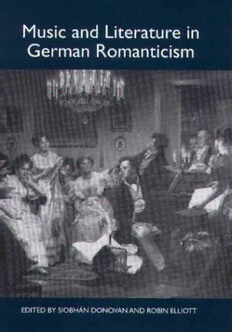
Music and Literature in German Romanticism (Studies in German Literature Linguistics and Culture) PDF
267 Pages·2004·1.085 MB·English
Most books are stored in the elastic cloud where traffic is expensive. For this reason, we have a limit on daily download.
Preview Music and Literature in German Romanticism (Studies in German Literature Linguistics and Culture)
Description:
The interrelationship between music and literature reached its zenith during the Romantic era, and nowhere was this relationship more pronounced than in Germany. Many representatives of literary and philosophical German Romanticism held music to be the highest and most expressive, quintessentially Romantic art form, able to convey what cannot be expressed in words: the ineffable and metaphysical. The influence was reciprocal, with literature providing a rich source of inspiration for German composers of both instrumental and vocal music, giving rise to a wealth of new forms and styles. The essays in this volume are selected from papers presented at an international, interdisciplinary conference held at University College Dublin in December 2000, and include contributions from Germanists, musicologists, comparatists, and performance artists. This interdisciplinarity makes for informed and complementary approaches and arguments. The essays cover not only the "Romantic" nineteenth century (commencing with the early Romanticism of the Jena circle), but also look ahead to the legacy, reception, and continuation of German Romanticism in the modern and postmodern ages. Alongside new readings of familiar and established writers and composers such as Goethe, Hoffmann, Wagner, and Schubert, a case is made for other figures such as Wackenroder, Novalis, Schlegel, Schumann, Brahms, Liszt, and Berlioz, as well as less-known figures such as Ritter, Schneider, and Termen, and for a reconsideration of questions of categorization. The essays will appeal to readers with a wide variety of academic, musical, and literary interests.Siobhán Donovan is a Lecturer in the Department of German at University College Dublin. Robin Elliott is Jean A. Chalmers Chair in Canadian Music at the University of Toronto.
See more
The list of books you might like
Most books are stored in the elastic cloud where traffic is expensive. For this reason, we have a limit on daily download.
